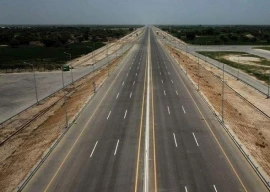
The Pakistan Institute of Development Economics (PIDE) has initiated a reform agenda called “ISLAAH: Immediate Reform Agenda - IMF and Beyond,” aimed at steering Pakistan towards economic stability and growth amidst a financial crisis.
The strategy responds to the urgent need for external financing exceeding $120 billion over the next five years, as highlighted by the recent IMF Report.
PIDE Vice Chancellor Dr Nadeemul Haque stressed the importance of a comprehensive approach to address Pakistan's economic challenges. The reform agenda focuses on regulatory modernization, tax reform, market liberalization, energy sector efficiency, and improvements in agriculture and banking.
One key aspect is the implementation of a 'Regulatory Guillotine' to remove cumbersome regulations hindering business growth. The agenda also includes debt restructuring, comprehensive tax reforms, and strategic measures to boost exports and modernise import regulations.
These reforms aim to catalyse investment, create jobs, and foster higher GDP growth.
PIDE's Senior Research Economists, including Dr Ahmad Waqar Qasim, Dr Afia Malik, and Dr Mahmood Khalid, highlighted the need to streamline governance by addressing regulatory burdens and promoting clear rules over permissions, inspired by successful strategies from other countries like India.
The agenda calls for tax simplification, policy certainty, and administrative reforms to enhance economic efficiency. It emphasizes openness in trade policies to prioritize exports and encourages market-driven practices to stimulate investment. Additionally, reforms in the real estate sector aim to unlock its potential and contribute significantly to economic growth.
In the agriculture sector, the focus is on improving seed industry processes to reduce costs for farmers and ensure quality standards. Overall, PIDE's reform agenda seeks to revitalize Pakistan's economic landscape through strategic reforms across various sectors.
“State-captured real estate represents an underutilised but immensely valuable resource, hindering downtown growth and contributing to urban sprawl nationwide.”
With thousands of government houses occupying vast swathes of prime land in Islamabad alone, the unrealised, particularly evident in Islamabad where thousands of government-owned properties occupy prime land, amounting to a staggering Rs2,278.6 billion in unrealised value, the experts highlighted.
“Unlocking this potential through rezoning and market-based high-rise developments could attract over $58.8 billion in investment, create 351,000 job opportunities, add 44.4 million square feet of commercial space, and generate an annual rental income exceeding Rs446.8 billion.
Published in The Express Tribune, April 22nd, 2024.




1730959638-0/trump-(19)1730959638-0-165x106.webp)



1724018265-1/City-Traffic-Police-(CTP)1724018265-1-270x192.webp)









COMMENTS
Comments are moderated and generally will be posted if they are on-topic and not abusive.
For more information, please see our Comments FAQ